#Throughline
Text
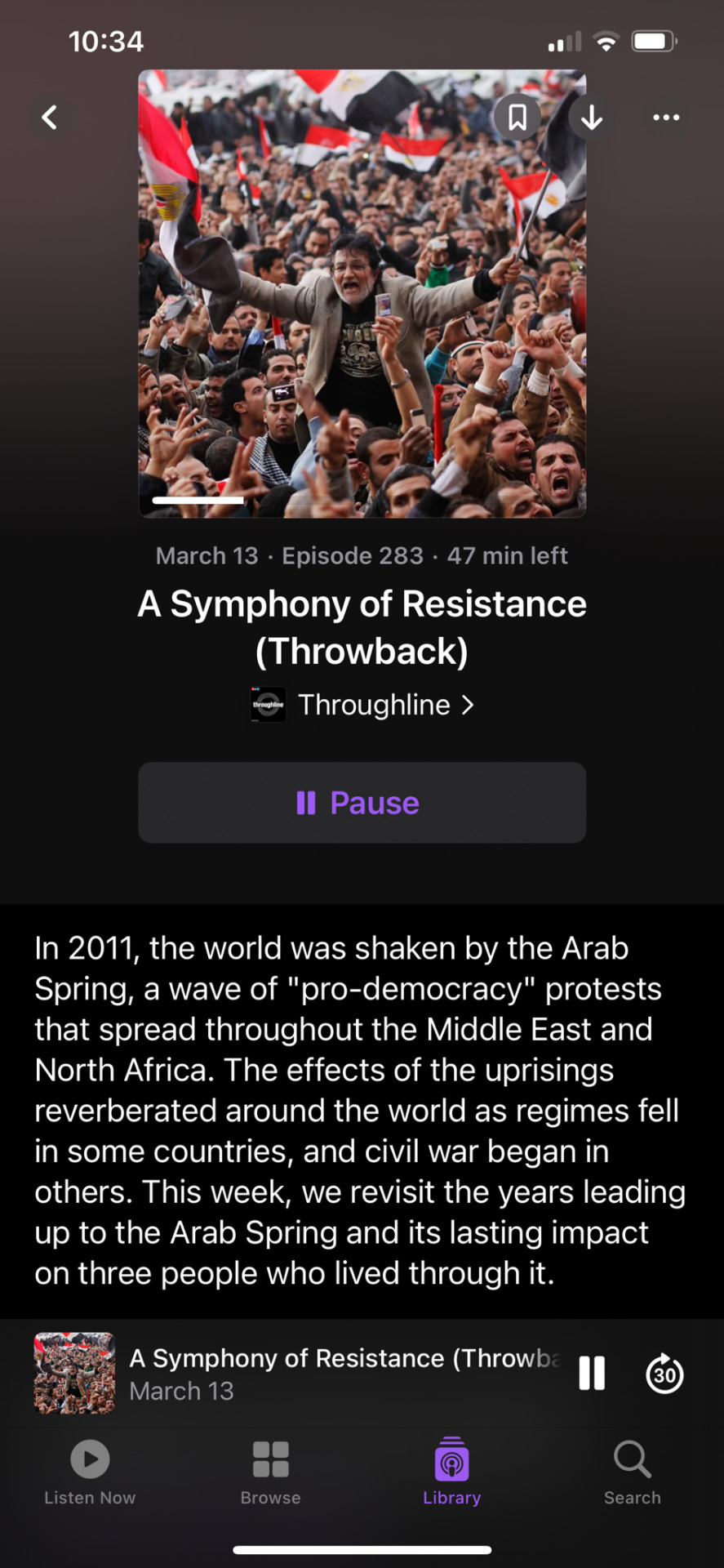
It’s been about one month since Aaron Bushnell, active duty serviceman, immolated himself in front of the DC Israeli embassy.
Today the UN called for a “non-binding” (qualifier added by US) ceasefire for the remainder of Ramadan (~two weeks). Meanwhile, yesterday Biden unilaterally approved another 3 billion dollars to be sent to Israel, begging the question, will Israel truly abide by a ceasefire?
In the past (years, not since Oct 7) ceasefires have been enacted, which Hamas and Palestinian Authority have respected, but Israel meanwhile would continue to control Gaza’s water, food & medical access, and yes, inflict violence upon Palestinian peoples. Knowing this, what is the incentive for Hamas to abide by a false ceasefire? when Israel now continues to murder children, rape women and cripple a population indefinitely.
Today I found my first real bit of info re: the Arab Spring of 2011. I worked within a large box bookstore at this time and through my years there, I was unable to find any literature on this topic. It’s been about 6 years and this may have changed, but typing “Arab Spring” into the billion dollar search function, there were NO RESULTS. This doesn’t mean the info wasn’t out there, somewhere, only that access wasn’t condoned, and academic thought was likely restricted (or … that’s how I understand it).
This is the podcast I found today and learned from. The show “Throughline” is really worthwhile in its entirety, but this episode shows us the power of social media and organizing dissent. On this near- anniversary of Aaron Bushnell political and radical act, I think a lot about the man in Tunisia who self immolated in January of 2011. His name was Mohamed Bouazizi, and his death sparked the Arab Spring,
Find it here.
#free palestine#palestine#gaza#free gaza#current events#Arab spring#end Islamophobia#stop israel#we are stronger together#podcast#podcast rec#Throughline#us politics#israeli apartheid#Palestine US solidarity#social media#TikTok#Facebook#education#Mohamed Bouazizi
21 notes
·
View notes
Text
Stories need a throughline – an important plot arc that encompasses the whole story. It helps us identify where the story starts, where it ends, and which events belong in the middle. Without that, the story will putter aimlessly until it wanders off or stops at an arbitrary point.
We can’t do much plotting until we know what our throughline is. But the more complex our stories are, the tougher it can be to identify whether we have a throughline and, if so, whether that throughline needs work.
4 notes
·
View notes
Link
3 notes
·
View notes
Text
"I think what people don't understand about the credit score is the way that it's produced. It is mysterious to people how the credit score goes up and down, and that's partially by design. So the developers of credit scores don't want to share with the public exactly how their algorithms work, and the reason is that they fear that consumers will try to game the system if they know somehow that if they do X behavior, it'll change their credit score. So there are, you know, efforts to try to reverse engineer it, but really, the algorithm is obscure on purpose."
Josh Lauer, Throughline podcast episode What's Your Worth?
#i'm only 10 min into this episode and already want to throw things out the window#I HATE IT HERRRRE#credit score#throughline
1 note
·
View note
Text
Your Throughline
Writers may develop a “throughline” to guide the plot development of a story. Dictionary.com provides the following definition of a throughline: “a theme or idea that runs from the beginning to the end of a book, film, etcetera.”
The throughline unifies a story, gives it cohesion and clarity, and impels a strong message. While editing, a good rule of thumb for the author is to ask, for every…
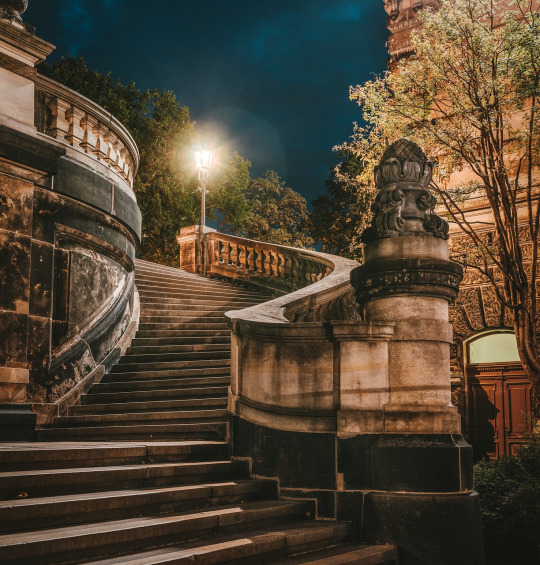
View On WordPress
0 notes
Text
main cast of succession in interviews: yeah i’ve really loved getting to delve into this character and working with all these incredible people, this show is just so amazing and i’m so sad to be leaving
supporting cast of succession in interviews: oh my character? gay. really fuckin gay. me and the 20 year olds who make taylor swift edits on twitter decided so
#shut up riley#succession#no but it is really funny that this has been a throughline between arian and dagmara and now justin…it’s incredible
13K notes
·
View notes
Text
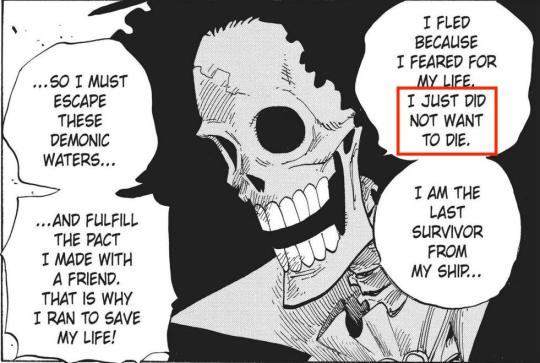
This idea is so, so important to the series in general, and Brook in particular. There are times in One Piece where people die for noble causes, and others where people act knowing that there's a good chance that they could die, but knowingly choosing death over life is never portrayed in a positive light.
As someone who views One Piece through the lens of Romantic literature, this is really important because historically the Romantics, er, well, romanticized suicide and death and the historic last stand. It's doubly interesting to me as a Japanese story, with Japan having its own long, complicated history with the concept of honorable death.
One Piece directly challenges both of these ideas, with life and living being romanticized instead, even if that means you have to get on your knees and beg for it like Brook does with Ryuma later on.
And it's a tightrope that story has to balance. Nami willingly lived under to boot of the man who killed her mother for years, but there came a time when enough was enough, and both she and the village had to stand up and fight for her freedom. She carried that lesson to her fight with Enel, even though she was hopelessly outmatched and would have been reduced to a greasy smear if Luffy hadn't shown up to save her. Within the context of the story both instances were portrayed positively, with Oda indicating through his writing that she had made the correct decision.
But that's not what's happening here. This is Luffy being willing to run away at Sabaody because he knew the Pacificas were too strong. This is Usopp lambasting the samurai at Wano for rushing toward their deaths rather than living to fight another day.
It's Brook knowing he made a promise to a friend, and doing everything in his power to keep it, even if it meant looking like a sniveling coward groveling at the feet of his own shadow.
#opbackgrounds#one piece#ch456#themes threads and throughlines#romanticism#brook#I love him so much#character analysis
2K notes
·
View notes
Text
yeah sure read Stone Butch Blues to understand he/him lesbians but don’t forget the unionizing your workplace part
#its about trans dykery but the communism is rlly the main throughline#stone butch blues#leslie feinberg
11K notes
·
View notes
Note
Genuinely curious about your take on Dick’s relationship with being both a natural performer and a private person at heart.
bruce wayne and dick grayson are very similar in many ways, but i'd say one of the most profound is their shared grief - experiencing immense personal loss at eight years old, in a spotlight on a stage that they can never truly leave. in the same way that the waynes murder cast bruce as a tragic figure in gotham, who can never escape the shadow of his parents passing. he was alone in the alley, but he will never stand alone without that weight of an audience again.
but the graysons literally died onstage, during a performance, before a horrified crowd. there is no part of dick's loss that is private. there is no part of this loss that is his alone. he is a born performer who loses everything, then transforms that grief into a literal symbol of light, which is taken from him again. how would u not want to fiercely protect what u have left? why would u ever want to share urself with a world that has already seen everything u are, and still wants more?
someone like that would bury themselves so deep that it becomes a non-story. nothing escapes the tight grip he holds over himself, the trickle of personal information he lets escape at a time. he wants eyes to pass over him, utterly disinterested. the less remarkable he is, the better. the easier he is to ignore, the more he can breathe.
brucie wayne is a performance for a goal, to hide in plain sight, but the art of pretending to be dick grayson is an act of self preservation. his body is not his own, nor were his parents. his name has created a legacy he has no control over. every kind smile is an effort to detract further questions. every barb, every cruel word means people might refuse to dig deeper. if he is nice, he is trusted. if he is mean, he is reviled. there is nothing more terrifying than being truly seen and still found wanting. people only get to witness what he wants them to. he controls the light, and the stage. the art of the performance is only showing the audience what u want them to see. never reveal ur hand. never show the other side of the box. and always keep the curtains drawn.
#ok quick post then im dipping again#dick grayson would **** himself before posting a thirst trap or making a tiktok and thats a throughline of persephone so gn folks!!!#dick grayson#bruce wayne#nightwing#batman#dc comics#the ask and the answer
363 notes
·
View notes
Text
Changing Channels as gay dean propaganda. After Gabriel I guess sees Dean watching Dr. Sexy, somehow knows Dean likes Dr. Sexy, AND after Gabriel sees just how Dean reacts to his Dr. Sexy and sees that Dean’s crush is so legit as to break the illusion and help Dean uncover Gabriel, Gabriel– as his torture meant to break them– scripts Dean into a sitcom scene version of Supernatural where he’s hooked up with a random woman in a bikini. This is Supernatural as a tv show written by Gabriel within Chuck’s universe, so it’s essentially a parody of the most shallow read of the show possible. And while Dean’s reaction to Dr. Sexy was entirely unscripted and real, a true act of his free will, his encounter with the woman in the motel room is entirely forced, scripted by an angel, and fake.
WOMAN But we did do work! In depth.
Laugh track. DEAN waves at her as she leaves. SAM shuts the door and shakes his head. DEAN speaks through a forced smile.
DEAN How long do we have to keep doing this?
And it’s torture, and it's so interesting that this in particular is torture, because it's not like getting shot or slapped or strapped to a machine to get hit in the balls, it's just a dollhouse version of Chuck’s bigger universe, endlessly playing their parodistic roles that Gabriel has assigned to them.
And then Dean, in another genuine act of free will, goes on to figure out the Trickster is an angel because of Cas’s literally disrupting the plan by breaking into the fake, scripted Supernatural™ where Dean is scripted to act as if he's had sex with a random hot woman, and Dean figures it out because he can read Cas and knows him and can tell that Cas knows Gabriel just by seeing how he looks at him.
#i think about this whenever i watch this episode and lose my mind every time#spn 5x08#gay dean#free will#queerness as free will being a throughline in spn is everything to actually#spn thoughts
238 notes
·
View notes
Photo

Qatar's World Cup : Throughline : NPR
0 notes
Text
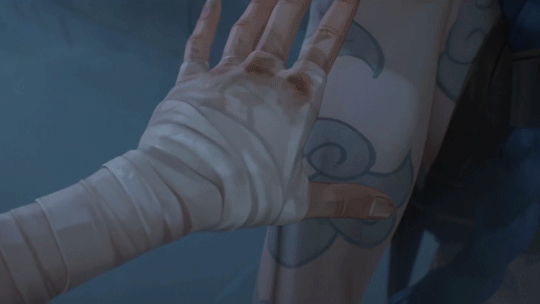

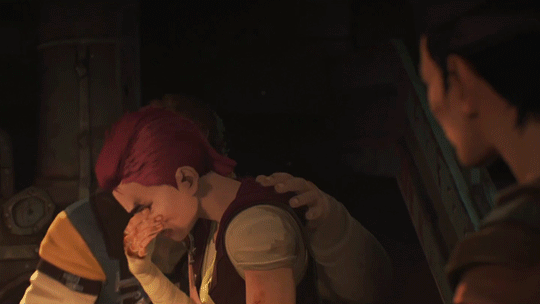
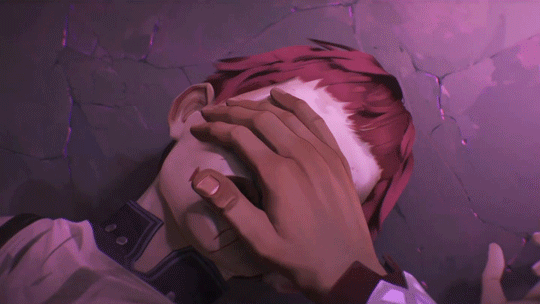


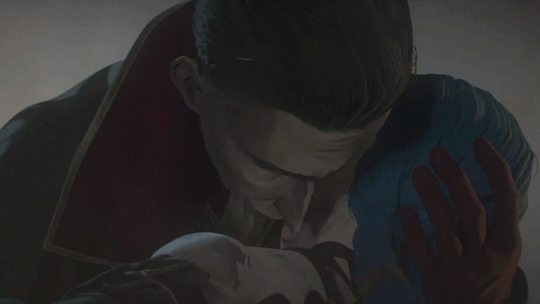

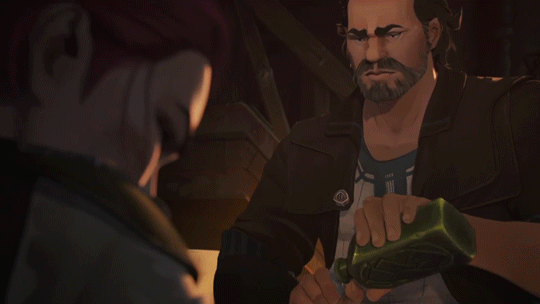
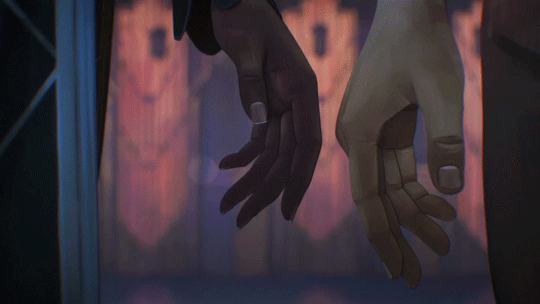
Arcane: Tenderness
#Arcane Throughlines Series#arcane#jinx#caitlyn arcane#ekko arcane#jayce arcane#jinx arcane#mel arcane#silco arcane#silco and jinx#vander arcane#vi arcane#vi and jinx#tenderness#flashing tw
1K notes
·
View notes
Text
okay well ACTUALLY i will elaborate on my Whirl feelings. fandom tends to parse 'I want my hands back' as Whirl very specifically being upset he has claws, because they are assumed to be less functional, and broadly that he wants a body which is not empurata'd again. but as I said in this post, we know people who underwent empurata can get new hands and faces- perfectly good ones. tarn used to be damus and damus was a victim of it too, and they got the guy a whole new body! there's no way that with ratchet as autobot CMO, he would not be insistent that they make time and find resources for any empuratee who wants new hands or a new face at SOME point throughout the war. let alone now it's over.
but they would be new ones. the point is that when whirl says 'i want my hands back' he doesn't (just) literally mean 'i want hands again instead of claws', or even 'i want the original hands i was forged with back'. i would argue he means he wants to go back to the person he used to be before the shit he went through beat him into a new shape he hates. (because whirl reeeeally hates himself. we are literally introduced to him during a suicide attempt as his defining character moment, i mean…) but he can't, because that's not possible, and getting new hands won't magically make him the person he was when he was a watchmaker even if it'd make it easier to make watches again.
and that's why whirl doesn't get new hands or a new face! because it's scary to admit that doing so doesn't make him the person he once was again, and if he did it and was still the same damn person, it would be that ultimate proof that nothing he does will ever acheive this. it's safer to remain as he is in a body he hates than to change it and not actually have solved the underlying issue.
it's also why he rejects the offer of ratchet's hands in LL #25. at that point, he has been able to accept the person he now is and will always be going forward, so they no longer carry the same symbolism. sure, that means he could choose to take them without fear, but it also means he can reject them as not really necessary anymore, and i think it makes the most sense for whirl's arc that he chooses the latter, tbh.
(sidenote: especially worth noting we never actually see if whirl can't make watches with his claws. he can at least make clocks! i've seen people suggest you can interpret it as him actually being perfectly capable with his current frame and he doesn't want to admit it and learn a new way because *points at above*, and honestly, intentional reading or not, i fully buy this. i like to imagine post-canon, he's perfectly good at making them with his current hands, because now he's not so hung up on all that baggage that teaching himself the necessary new techniques is unbearable to consider like it was before. this also has the bonus of mitigating some of the comic's uhhh. confusing? messaging around forged/constructed stuff and disability, so i'll take it.)
#i don't talk about whirl as much as some characters but pound for pound#he just is one of the BEST characters in the comic imo#just such a solid throughline that rewards paying close attention to him#idw#whirl#meta
226 notes
·
View notes
Link
Throughline Games, the studio behind ... https://www.xtremeservers.com/blog/forgotton-anne-studio-unveils-gorgeous-spiritual-sequel-forgotlings/?feed_id=76682&_unique_id=64810d2a90c53&Forgotton%20Anne%20studio%20unveils%20gorgeous%20%22spiritual%20sequel%22%20Forgotlings
0 notes
Note
I read your review of Poor Things and I was wondering if you had any thoughts on the section in Alexandria? It was horrifically executed on many levels but narratively, that part of the film is about Bella learning about class structure. She rebels against the cruelty of society through charity then by working as a prostitute, during which time she has cruelty inflicted upon her instead. Finally, she realizes that God’s creation of her was ultimately cruel, and then she runs away with her ex-husband-father only to realize that her prior self-mother was fundamentally characterized by cruelty, especially to her “lessers.” She then decides once again that she does not want to be cruel, but then she achieves this by taking God’s place as the doctor-patriarch and ruling his household with a new pet goat. The entire film is also about Bella learning about feminism: the arbitrary oppression of women is not only nonsensical, it’s bad! But then the ending has her reproduce almost all those power structures and cruelty she claims to reject, and has the unfortunate consequence of positioning her as ultimately equally cruel/callous as God, the guy she meets on the boat who shows her all the starving people, and her former self-mother, etc. I was wondering if you had any thoughts on why this is or like, what the director’s message was beyond self-contradiction and taking cheap shots at starving people?
so i would quibble a bit with the idea that bella's experience in the maison-close is exclusively or even primarily portraying sex-for-pay as a site of cruelty. i think it's more depicting paid sex as work, and work as unpleasant and repressive, and that's why the maison is the site where bella gets involved in socialist politics—if moral philosophy is the arena by which she responds to the injustice of the poverty in alexandria, then labour politics plays the analogous role where the maison is concerned. her problems there aren't inherently with the idea of being paid for sex, but with specific elements of the work arrangement (eg, she suggests that the women should choose their clients, rather than vice versa). ofc she has some customers who are cruel or thoughtless or rude, but i didn't read the film as suggesting that was universal to sex work, and the effect of the position is more to demystify sex, for bella, than to convert it into being purely a site of trauma or misery. now i don't think this film offers a particularly blistering or deep analysis of sex work or socialism or wage labour, dgmw, but i do think the function of the maison is different narratively to that of the alexandria section.
anyway to answer your actual question: yeah so this is really my central gripe with the film. lanthimos (slash his screenwriter tony mcnamara) spends much of the film gesturing toward bella's growing awareness of several hierarchical structures that other characters take for granted: the uneven nature of the parent/child relationship (god took her body and created her without asking); class stratification (alexandria); the 'civilisation' of individuals and societies via education and bio-alteration (bella's talk about 'improving' herself; her 'progression' from essentially a pleasure-seeking child to an educated and 'articulate' adult). these three dimensions often overlap (eg, the conflation of 'childishness' with lack of education with inability to behave in 'high society'), though, most overtly, it's in that third one that we can see how these notions of improvement and biological melioration speak to discourses about the 'progress' and 'regress' of whole societies and peoples, and voluntarist ideas about how human alteration of biology (namely, our own) might produce people, and therefore societies, that are better or worse on some metric: beauty, fitness, intelligence, morality, longevity, &c. this is why i keep saying that like.... this film is about eugenics djkdjsk.
the issue with the alexandria section to me is, first, it's like 2 minutes (processed in the hollywood yellow filter) where the abject poverty of other people is a life lesson for bella. we're not asking any questions like, how is that poverty produced, and might it have anything to do with the ship bella is on or the fantastical lisbon she left or the comparative wealth of paris and london...? secondly, everything that the film thinks it's doing for the entire runtime by having bella grapple with learning about cruelty, and misery, and the kinds of received social truths that lanthimos is able to problematise through her eyes because she's literally tabula rasa—all of that is just so negated by having an ending in which she bio-engineers her shitty ex-husband, played as a triumphant moment. i don't even inherently have an issue with the actual plot point; certainly she has motive, and narratively it could have worked if it were framed as what it is: bella ascending to the powerful position in the oppressive system that created her, and using her status to enact cruelty against someone who 'deserves' it—ie, leveraging her class and race within the existing social forms rather than continuing to question or challenge them. if that ending were played as a tragedy, or a bleak satire, it would at least be making A Point. but it's not even, because it's just framed as deserved comeuppance for this guy we were introduced to in the 11th hour as a scumbag, so it's psychologically beneficial for bella actually to do the sci-fi surgery to him that literally reduces him to what's framed as a lower life form. unserious
#the favourite and the lobster also have some troubling body and disability politics and i think this is a throughline with lanthimos#but this one is particularly egregious to me given the ending lol#poor things
209 notes
·
View notes